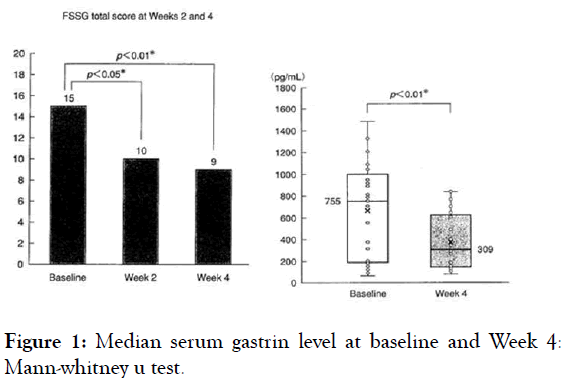PMC/PubMed Indexed Articles
Indexed In
- Academic Journals Database
- Open J Gate
- Genamics JournalSeek
- JournalTOCs
- China National Knowledge Infrastructure (CNKI)
- Scimago
- Ulrich's Periodicals Directory
- RefSeek
- Hamdard University
- EBSCO A-Z
- OCLC- WorldCat
- Publons
- MIAR
- University Grants Commission
- Geneva Foundation for Medical Education and Research
- Euro Pub
- Google Scholar
Useful Links
Share This Page
Open Access Journals
- Agri and Aquaculture
- Biochemistry
- Bioinformatics & Systems Biology
- Business & Management
- Chemistry
- Clinical Sciences
- Engineering
- Food & Nutrition
- General Science
- Genetics & Molecular Biology
- Immunology & Microbiology
- Medical Sciences
- Neuroscience & Psychology
- Nursing & Health Care
- Pharmaceutical Sciences
Short Communication - (2021) Volume 0, Issue 0
Efficacy and Gastrin Levels in Gastroesophageal Reflux Disease Patients Treated with Esomeprazole Following a Potassium: Competitive Acid Blocker
Shinichi Ishihara*Received: 26-Mar-2021 Published: 19-Apr-2021, DOI: 10.35248/2157-7560.21.s13.004
Introduction
PPI drastically changed treatment of acid-related diseases. Later, P-Cab was launched in Japan as an acid secretion inhibitor with new MoA, attracting much attention for its more powerful inhibition effect than conventional PPIs. In order to verify the clinical efficacy of P-Cab, controlled clinical trials comparing between P-Cab and PPI were conducted at several medical institutions in Japan [1-4]. Researchers found that there was no significant difference in post-ESD ulcers. As P-Cab inhibits acid secretion more powerfully than conventional PPIs, it was expected that P-Cab would outperform PPI in clinical efficacy in GERD, but just the opposite results were reported one after another, where P-Cab was found comparable or inferior to PPI. In addition, it was found that P-Cab caused a notable increase in gastrin levels along with strong inhibition of acid secretion. The authors and others who conducted the trials decided to determine why GERD symptoms did not improve in spite of adequate acid suppression, and how these symptoms were related to elevated gastrin levels secondary to P-Cab administration. In order to clarify these questions, we decided to investigate how switching from P-Cab to Medium can impact symptom improvement and gastrin levels in patients on P-cab whose symptoms previously did not improve as expected.
Methods
Esomeprazole 20 mg was orally administered to RE patients who had been treated with Vonoprazan 20 mg once daily for more than 4 weeks. Primary endpoint was changes in the total scores at Week 4 based on the frequency scale for the symptoms of Gastroesophageal Reflux Disease (FSSG) questionnaire. The secondary endpoints were changes in the reflux scores, motility scores, and total scores evaluated based on the FSSG questionnaire, changes in serum gastrin levels, and tolerability.
Results
In 25 patients with mean age of 60.5 years, median FSSG total score demonstrated a significant decrease both at Week 2 (p<0.05)and Week 4 (p<0.01). Median FSSG reflux score demonstrated a significant decrease both at Week 2 (p<0.01) and Week 4 (p<0.001). Median FSSG motility scores showed no statistical significance at any time. Median serum gastrin level significantly decreased from 755 pg/mL at baseline to 309 pg/mL at Week 4 (p<0.01) (Figure 1).

Figure 1: Median serum gastrin level at baseline and Week 4: Mann-whitney u test.
Conclusion
The results suggested that acid suppression alone does not produce desired clinical efficacy, and that the gastrin levels before and after the switch had correlations with the patients' symptoms, offering the possibility that excessive acid suppression may increase gastrin levels, resulting in gastric dysmotility.
I believe that excessive acid suppression as one demonstrated with P-Cab [5] is unnecessary clinically, and that for diseases that require long-term treatment such as GERD and drug-induced ulcers, it makes sense to suppress stomach acid to the minimum in respect of its natural biological balance developed through human evolution.
As a future issue, I believe that clinical trials are needed to thoroughly examine the secondary effects of sustained increase in gastrin levels caused by the use of P-Cab in Japanese subjects.
REFERENCES
- Ishihara S. Treatment of Reflux esophagitis in daily clinical practice; Efficacy and symptom improvement with noble PPI esomeprazole. Pharma Med. 2012;30:77-83.
- Sakurai Y, Mori Y, Okamoto H, Nishimura A, Komura E, Araki T, et al. Acid-inhibitory effects of vonoprazan 20 mg compared with esomeprazole 20 mg or rabeprazole 10 mg in healthy adult male subjects-A randomised open-label cross-over study. Aliment Pharmacol Ther. 2015;42(6):719-730.
- Kinoshita T, Sakurai Y, Shino M, Kubou K, Nishimura A, Miyagi T, et al. Evalution of the Efficacy and Safety of Vonoprazan in Patients with Nonerosive Gastroesophageal Reflux Disease: A Phase Ⅲ, Randomized, Double-Blind, Placebo Controlled, Multicenter Study.Curr Ther Res Clin Exp 2016;81:1-7.
- Katz PO, Gerson LB, Vela MF. Guidelines for the diagnosis and management of gastroesophageal reflux disease. Am J Gastroenterol 2013;108:308-328.
- Katz PO, Ginsberg GG, Hoyle PE, Sostek MB, Monyak JT, Silberg DG. Relationship between intragastric acid control and healing status in the treatment of moderate to severe erosive oesophagitis. Alment Pharmacol Ther. 2007;25(5):617-628.
Citation: Ishihara S (2021) Efficacy and Gastrin Levels in Gastroesophageal Reflux Disease Patients Treated with Esomeprazole Following a Potassium: Competitive Acid Blocker. J Vaccines Vaccin. S13:004.
Copyright: © 2021 Ishihara S. This is an open-access article distributed under the terms of the Creative Commons Attribution License, which permits unrestricted use, distribution, and reproduction in any medium, provided the original author and source are credited.


